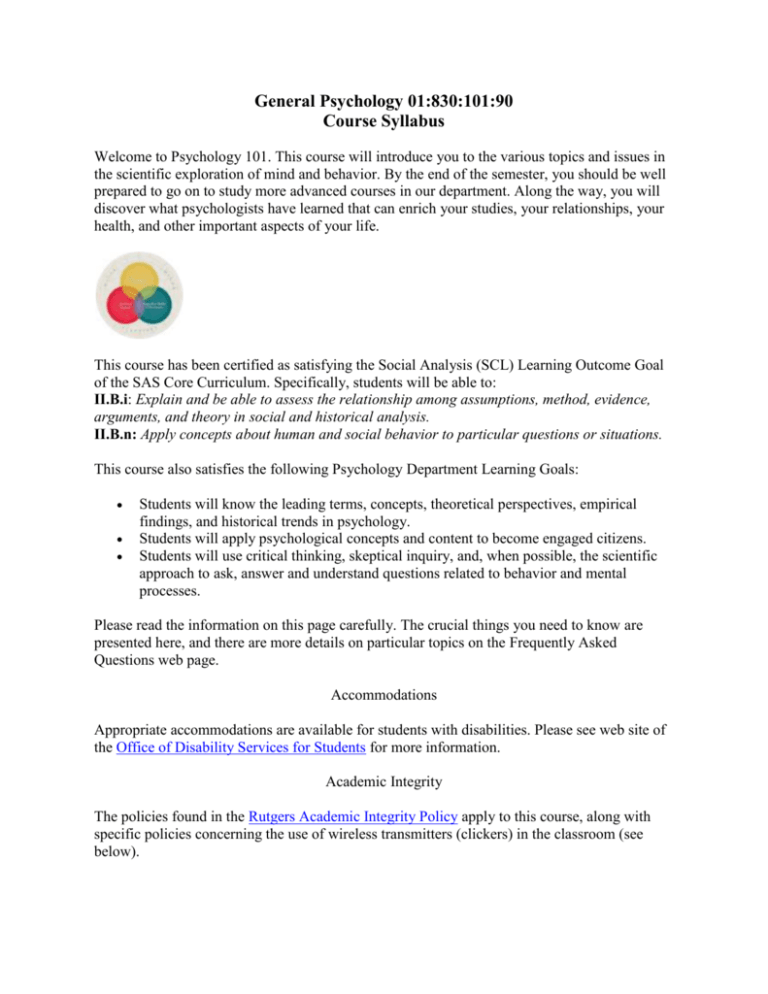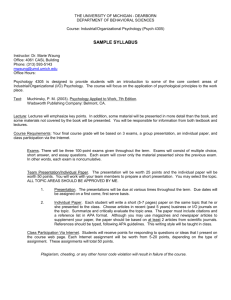Online830101Syl
advertisement

General Psychology 01:830:101:90 Course Syllabus Welcome to Psychology 101. This course will introduce you to the various topics and issues in the scientific exploration of mind and behavior. By the end of the semester, you should be well prepared to go on to study more advanced courses in our department. Along the way, you will discover what psychologists have learned that can enrich your studies, your relationships, your health, and other important aspects of your life. This course has been certified as satisfying the Social Analysis (SCL) Learning Outcome Goal of the SAS Core Curriculum. Specifically, students will be able to: II.B.i: Explain and be able to assess the relationship among assumptions, method, evidence, arguments, and theory in social and historical analysis. II.B.n: Apply concepts about human and social behavior to particular questions or situations. This course also satisfies the following Psychology Department Learning Goals: Students will know the leading terms, concepts, theoretical perspectives, empirical findings, and historical trends in psychology. Students will apply psychological concepts and content to become engaged citizens. Students will use critical thinking, skeptical inquiry, and, when possible, the scientific approach to ask, answer and understand questions related to behavior and mental processes. Please read the information on this page carefully. The crucial things you need to know are presented here, and there are more details on particular topics on the Frequently Asked Questions web page. Accommodations Appropriate accommodations are available for students with disabilities. Please see web site of the Office of Disability Services for Students for more information. Academic Integrity The policies found in the Rutgers Academic Integrity Policy apply to this course, along with specific policies concerning the use of wireless transmitters (clickers) in the classroom (see below). Research Participation Requirement Research is an essential part of the field of psychology. It is important for students to be exposed to either actual participation as a subject in an experiment, or at the very least, to learn from technical articles how research is done. Therefore, all sections of General Psychology require either five "Research Participation Units" of experiment participation or an alternative assignment of writing two papers describing psychological research. The psychology department's Human Research Student Requirements web page explains exactly what you must do. To sign up as a subject for experiments, to cancel an appointment you have already made, to find out how many Research Participation Units you've earned so far, or to contact a researcher for any reason, go to the Human Subject Pool System web site. If you choose to write the 2 papers instead of participating in experiments, you must submit the first paper on or before the midpoint of the course and you must submit the second paper on or before the last Module date. See the Human Research Student Requirements web page (scroll down to the Option 2 section) for the specific requirements for the papers (including how you must format your papers, what journals are acceptable as sources for your articles, etc.). Completion of Online Assignments Participation in this course will require you to complete assigned readings, video viewings, interactive exercises, and quizzes according to the course schedule <See sample schedule below>. Exams There will be two multiple-choice exams in the course. Each exam will take place on campus and include 60 multiple choice questions. See the course schedule for the dates of the exams. Test questions will be taken from both the textbook and material from multimedia and interactive exercises. Make-up exams: You may make up an exam only if you provide legitimate documentation verifying that you missed the exam because of an excused absence. Grades Your grade will be the result of the combination of your in-class participation and your exam scores, as follows: Exams 70% Online assigments 30% The result of the combination of the above scores will be compared to the following table to determine your grade for the course: 90% or above A 8589% B+ 7579% C+ 60-69% D 8084% B 7074% C Below 60% F Your grade will be determined solely on the basis of the total of your scores on exams and online assignments. Changing Grades: Students sometimes ask professors to change final grades, usually based on the need to achieve a certain grade in order to, for example, get into the business school, retain a scholarship, or avoid academic probation. Although I wish all of you the best of success in your studies, you hopefully can understand how changing one student's grade is unfair to the other students in the class. Therefore, requests for test score or grade changes will not be entertained. Additional Instruction You can get additional help with this course through tutoring sessions provided by the Rutgers Learning Centers. Additionally, there are academic coaches at these centers who can provide individualized help with general study and test preparation skills. For more information, see the course Frequently Asked Questions web page. <Link to be provided> Sample Course Schedule Date Due: <Date> Date Topic Module 1: Introduction and overview of the course Module 2: What is Psychology? <Date> Module 3: Scientific Methods in Psychology (Part 1) <Date> Module 4: Scientific Methods in Psychology (Part 2) <Date> Module 5: Biological Psychology (Part 1) <Date> Module 6: Biological Psychology (Part 2) <Date> Module 7: Memory (Part 1 ) <Date> Module 8: Memory (Part 2 ) <Date> Module 9: Sensation and Perception (Part 1) <Date> Module 10: Sensation and Perception (Part 2) <Date> Module 11: Human Development (Part 1) <Date> Module 12: Human Development (Part 2) <Date> Module 13: Learning <Date> Midterm Exam <Date> Module 14: Cognition and Language (Part 1) <Date> Module 15: Cognition and Language (Part 2) <Date> Module 16: Intelligence and Its Measurement <Date> Module 17: Consciousness <Date> Module 18: Motivation <Date> Module 19: Emotions, Sress, and Health (Part 1) <Date> Module 20: Emotions, Stress, and Health (Part 2) <Date> Module 21: Social Psychology (Part 1) <Date> Module 22: Social Psychology (Part 2) <Date> Module 23: Personality (Part 1) <Date> Module 24: Personality (Part 2) <Date> Module 25: Abnormality and Psychotherapy <Date> Module 26: Specific Disorders and Treatments Part 1 <Date> Module 27: Specific Disorders and Treatments Part 2 <Date> Final Exam




